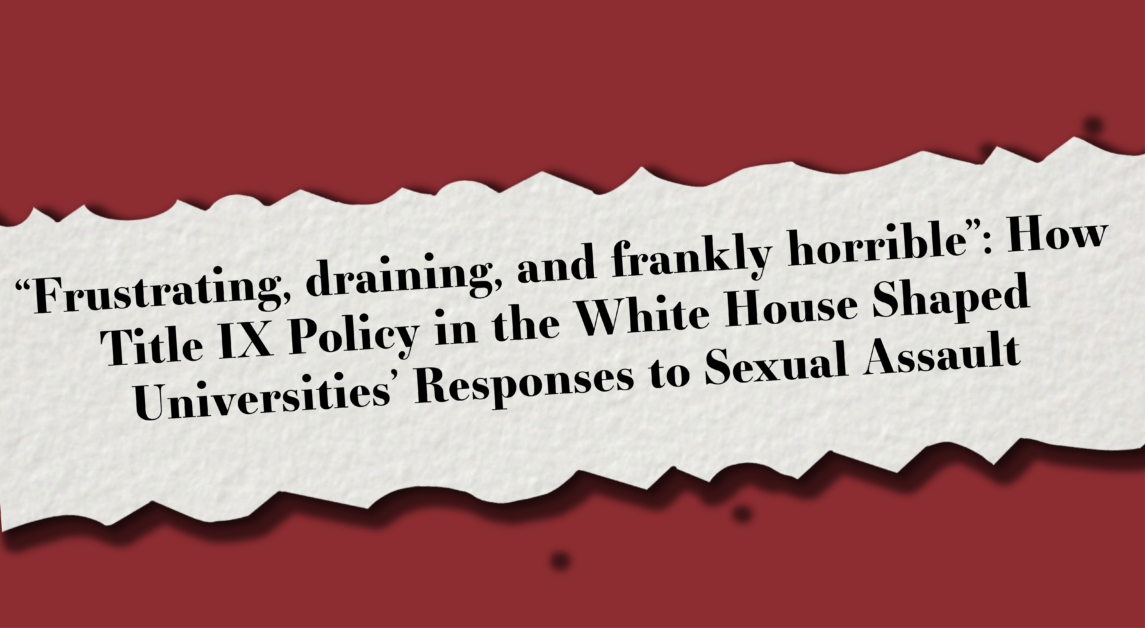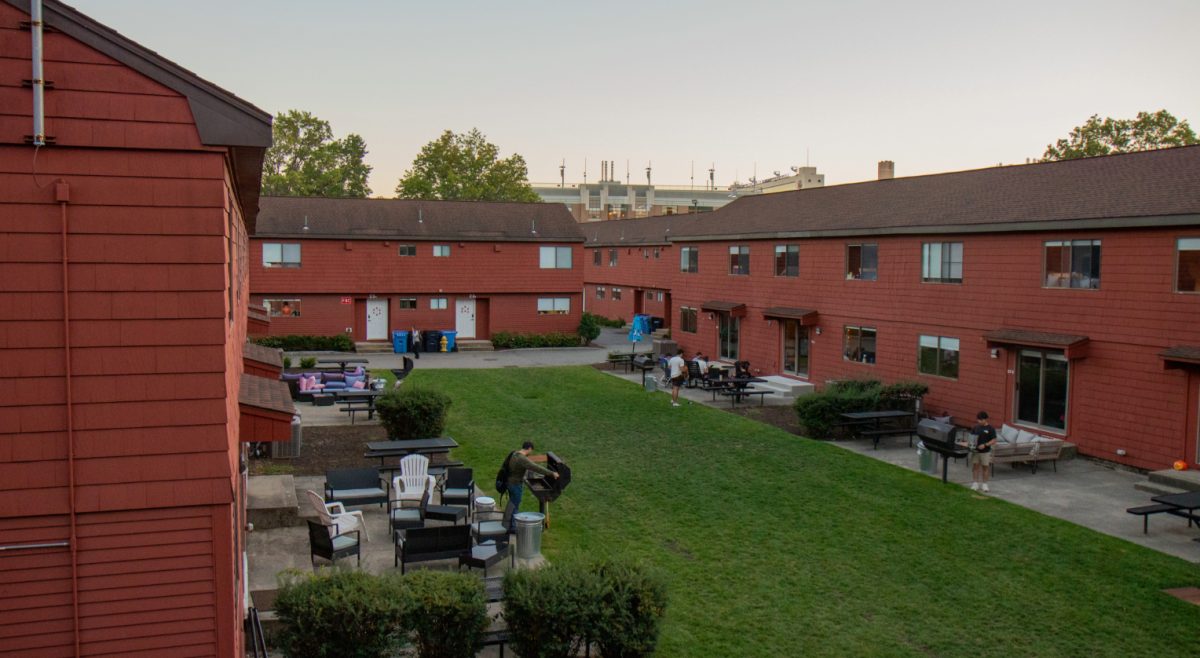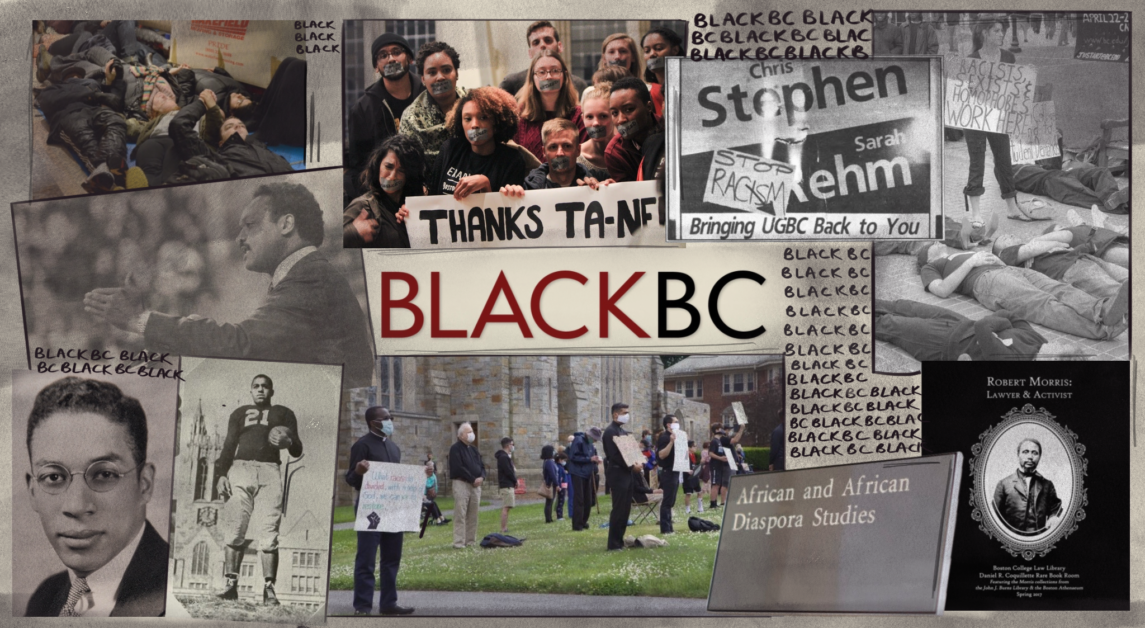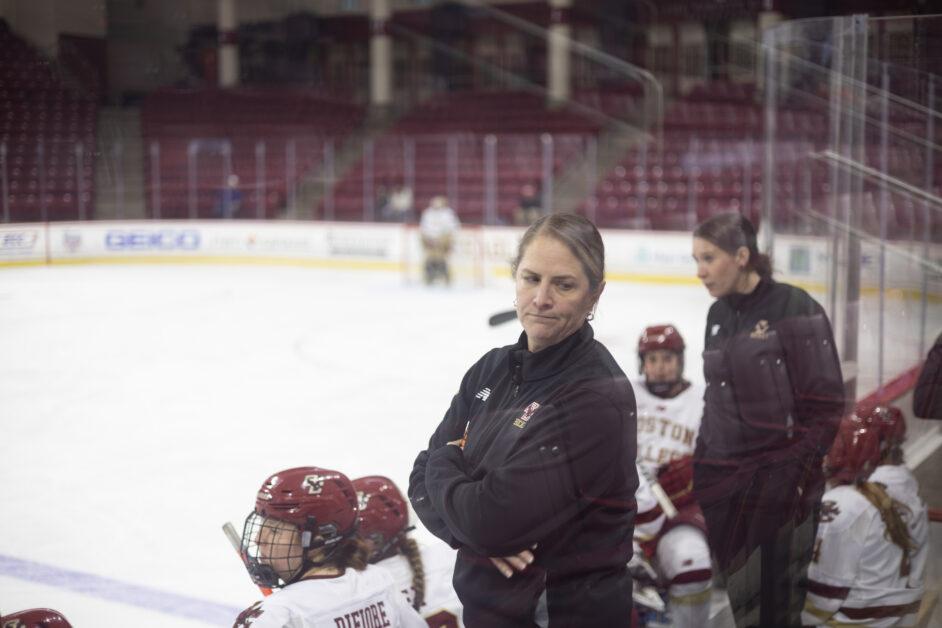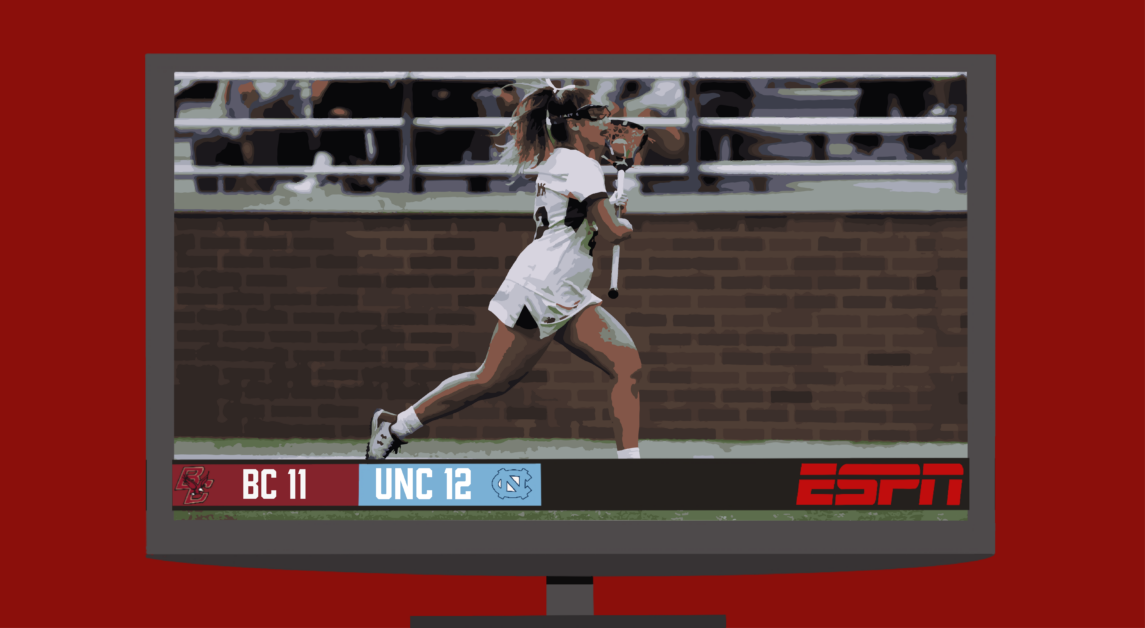Professor Kay Schlozman said when she was in graduate school in the pre-Title IX era, female students knew which male faculty members to avoid out of fear of being sexually assaulted or harassed.
“When I was a graduate student, women Ph.D. candidates were simply fair game for male faculty,” said Schlozman, the J. Joseph Moakley Endowed Professor of Political Science.
Schlozman, who has been a professor at Boston College since 1974, said she largely avoided sexual harassment, as she was married during graduate school, but there were certainly plenty of male harassers on campus.
“You know, we didn’t have a vocabulary about it,” she said. “One of my best friends was writing a special paper with him [a harasser], and she used to wear her trench coat to his office, and she would position the chair just so he couldn’t paw at her.”
On June 23, 1972, former President Richard Nixon passed Title IX of the Education Amendments of 1972. With just 37 words, Title IX states that:
“No person in the United States shall, on the basis of sex, be excluded from participation in, be denied the benefits of, or be subjected to discrimination under any education program or activity receiving Federal financial assistance.”
Fifty years later, Title IX has come to mean so much more than what the original 37 words initially covered. While Title IX legislation saw major strides for women’s equal treatment in athletics during the 1970’s, ’80s, and ’90s, the beginning of the 21st century marked the emergence of Title IX’s focus on sexual harassment.
As Title IX legislation regarding sexual harassment has developed and changed over the past decade, colleges and universities across the United States, including BC, have had to adapt their own Title IX policies as well, affecting on-going sexual harassment cases and students on campus.
The Start of Something New: Obama’s Second-Term Changes to Title IX
Beginning in 2011 with the release of a “Dear Colleague” letter, the former President Barack Obama’s administration sought to implement new guidelines under Title IX as to how schools should respond to sexual harassment reports.
The letter, issued by the Office for Civil Rights (OCR) at the U.S. Department of Education (DOE), notably articulated sexual harassment as including “unwelcome sexual advances, requests for sexual favors, and other verbal, nonverbal, or physical conduct of sexual nature.”
Both sexual harassment and sexual violence were declared covered under the protection of Title IX by the Obama administration—a statement that foundationalized universities’ responsibility to take preventative action against sexual harassment and sexual violence.
The “Dear Colleague” letter urged universities to first consider the location at which a sexual harassment case took place and the “hostile environment” it may create, then to publish a note of nondiscrimination, follow proper investigation steps, and publicly release their grievance procedures. These steps are contingent on proper employee training and the work of a Title IX coordinator, according to the letter.
While not on school property, the Obama administration ensured that student-on-student off-campus sexual harassment fell under schools’ legal responsibility.
Prior to Obama’s administration, most Title IX cases covered faculty-on-student cases rather than student-on-student cases, according to KC Johnson, a professor at Brooklyn College who chronicles Title IX litigation. Procedures for off-campus cases would later fall into a gray area for schools during the Trump administration.
While the OCR’s 2011 letter was considered as a guidance document, meaning it did not go through a comment and response process with the public and thus, was not forcible by law, Johnson said that schools were “aggressively” pressured to follow the letter’s guidelines after the OCR published a “Questions and Answers” document in 2014.
Johnson further explained that external social and political factors impacted schools’ responses to Obama’s Title IX legislation, creating unprecedented anti-harassment movements across the country.
The 2014 letter subjected schools to an investigation if they failed to follow the original letter’s guidelines. According to Johnson, fear of bad publicity from a possible investigation were at the forefront of many schools’ compliance with Obama’s guidelines.
“This was an issue where the investigation was the punishment,” Johnson said. “OCR would reveal the universities that were under investigations, and that would be very, very damaging for them in terms of PR.”
The Obama administration’s new Title IX guidelines strengthened victim protections, which shifted the perception that publishing student-on-student cases was bad publicity for schools Rather, Johnson said that schools reported cases to demonstrate their adhesion with federal Title IX law and to avoid harmful publicity.
In the aftermath of Obama’s letters, BC aligned with the Clery Act that requires colleges and universities receiving federal funding to publish campus crime statistics yearly by Oct. 1. BC also adhered to the new Title IX guidelines and reported its sexual assaults cases—which increased between 2014 and 2015 and 2015 to 2016.
In 2012, BC reported an incident of student-on-student assault that took place on an AHANA Leadership Council (ALC)–funded cruise. The alleged perpetrator, who was reporting on the event for The Heights, was detained the night of the assault and later served a three-semester suspension upon being found guilty.
While the University decision that found the perpetrator guilty was made in 2012 under Obama’s Title IX guidelines, the student filed a lawsuit against the University on Dec. 4, 2015. Since the lawsuit stretched into the Trump administration, DOE policy changes were highly influential in how BC responded.
The student, who was identified as John Doe, claimed a breach-of-contract and violation of basic fairness in his lawsuit against the University. Although charges against Doe were eventually dropped after forensic evidence and video analysis proved his innocence in 2014, Doe sought an expunged disciplinary record and $3 million in damages.
During the trial, District Court Judge Denise Casper instructed the jurors to consider whether the BC administrators improperly interfered in the hearings through either violation of the Student Code of Conduct or the implied promise of basic fairness.
Casper also instructed the jury to consider if a contract existed in the student guide, whether there was a breach of that contract, and whether Doe was owed damages. While these were the basic considerations, Casper ruled out testimonial considerations, the role of the University’s general counsel, and Doe’s emotional state during the time of the disciplinary process and the years that followed in the jury’s decision.
After a week of trials, the jury ruled in Doe’s favor on Sept. 23, 2019. Doe was awarded $102,426.50 in damages: $24,819.50 for tuition and fees for the semester he was suspended and $77,607 for one year of lost income as a result of his delayed graduation from BC.
2016–2020: DeVos Announces Changes to Title IX Legislation
Unlike during the Obama administration, Title IX was not a cornerstone of former President Donald Trump’s agenda.
“Maybe Trump knew what Title IX was, I couldn’t state with certainty that he did,” Johnson said. “One of the things that makes the Trump administration such an odd one is that you had an extremely hands-off president who was only concerned with a small variety of issues that he was engaged with, and then other issues he basically was wholly disengaged.”
Although Trump himself took a hands-off-approach toward Title IX, it quickly became a priority for Trump’s secretary of education, Betsy DeVos. In September of 2017, DeVos began the process of creating new Title IX legislation through the regulation legal process, meaning that the DOE had to prepare the regulations, release them publicly, and allow a three-month period for public comment.
While the legal process took three years and the regulations did not take effect until August 2020, Johnson said that unlike Obama’s regulations, schools were required to follow the new regulations.
Some of DeVos’s changes included requiring schools to allow cross-examination by the perpetrator’s lawyers or advocates. Schools are also now required to give notice if a student is charged of sexual assault or harassment and what the specific charges are, and universities cannot withhold evidence from the parties involved.
Johnson explained that under the Obama administration, universities were recommended to use trauma-informed training in both the investigation and the adjudication, but now universities are required to use neutral language.
In November 2018, a BC student, “Jane Roe” informed Associate Vice President for Student Health and Wellness and Deputy Title IX Coordinator for Students Melinda Stoops that a student athlete identified as “John Doe,” had engaged in a non-consensual sexual encounter with Roe while she was intoxicated.
On June 18, 2019, the University suspended “Doe” after finding him responsible for sexual assault in violation of BC’s Student Sexual Misconduct Policy. On July 29, 2019, Doe filed a civil suit against the University, in which he alleged that he was deprived of a fair process during disciplinary proceedings in the spring of 2019.
In August 2019, presiding Judge Douglas P. Woodlock overturned Doe’s suspension in part due to the “substantial likelihood that John Doe will succeed on his claims that he was deprived of fair process” during the University’s disciplinary process. The judge wrote that Doe would suffer “irrevocable harm” if the suspension was not lifted before the fall semester began.
In response, BC filed an appeal against the U.S. District Court’s decision to overturn Doe’s suspension on Aug. 28. Beginning in early November 2019, the First Circuit Court heard the lawsuit against BC’s investigative process in which Doe argued that the University’s “single investigator model” had violated the principle of fundamental fairness. Doe’s main complaint was that he did not have an opportunity to present questions for the investigators to ask of Roe and other witnesses.
At the time, BC’s sexual assault protocol utilized a pair of investigators—in this case, Assistant Dean of Students Kristen O’Driscoll and external investigator Jennifer Davis—who interviewed Doe, Roe, and 17 other witnesses. They also reviewed Eagle ID records, Uber receipts, several photos and videos of Roe taken throughout the night, and text messages sent by the two parties to other students, according to the investigatory report, which BC submitted as evidence.
On Nov. 13, the U.S. Court of Appeals for the First Circuit ruled that BC could reinstate Doe’s suspension. The opinion written by Judge Sandra L. Lynch overturned the previous U.S. District Court ruling and also remanded the case back to the U.S. District Court.
The case entered the discovery phase, a pre-trial fact-finding phase, in February 2020, and each side had until May 13 to complete discovery. On Sept. 23, 2020, the University filed documents that settled the case with Doe. While details of the settlement are not publicly available, The University wrote in a statement that “the case was dismissed by agreement of the parties.”
The settlement came in the wake of the implementation of the DOE’s new Title IX regulations, which all universities had to implement for the 2020–2021 academic year. According to BC’s Student Sexual Misconduct Policy for the 2020–2021 academic year, a sexual misconduct hearing will consist of an administrative hearing board panel or a hearing officer, all of whom will be trained on investigating sexual misconduct complaints.
Two of DeVos’s most significant changes, however, include narrowing the definition of sexual harassment and requiring that schools dismiss any complaints of sexual misconduct that occur outside or off of campus.
Under the Obama administration, sexual harassment was defined as “unwelcome sexual advances, requests for sexual favors, and other verbal, nonverbal, or physical conduct of sexual nature.” Under the DeVos Title IX regulation, the definition of sexual harassment was narrowed to include only instances that are “severe, persuasive, and objectively offensive.”
According to Johnson, DeVos’ based her decision to exclude sexual violence that occurs off campus from Title IX protections on the 1999 Supreme Court decision of Davis v. Monroe County Board of Education, which ruled that schools can be liable for Title IX violations if the conduct occurs in the midst of an educational activity or if it involves something the school has educational control over.
For DeVos, removing off-campus sexual harassment and assault from Title IX’s jurisdiction fell in line with the 1999 ruling.
At BC, students are assigned either three or four years of guaranteed campus housing in their acceptance letter. Although the majority of BC students live on campus, according to an article published by BC News in October 2018, in any given semester, some 1,200 of BC’s 9,377 undergraduates live off campus, with 65 percent of juniors living off campus.
Currently, if any BC student experiences sexual assault or harassment in their off-campus housing, due to DeVos’s changes, they are no longer legally protected under Title IX.
Many colleges and universities across the country, including the Association of Independent Colleges & Universities in Massachusetts (AICUM), which BC is a member of, publicly expressed concern over DeVos’ proposed changes to Title IX in January 2019. The same month, former Boston Mayor Martin J. Walsh, BC ’09, also voiced concerns about the changes and announced that he would be issuing a public comment to the U.S. DOE.
While legally universities are no longer required to pursue off-campus sexual harassment and assault cases, Johnson said that practically no universitiy chooses not to do so for various reasons, including risking harmful publicity.
Stoops said that the process of launching a Title IX complaint for an off-campus assault is the same as if it occurred on campus, despite the DeVos changes. It is the process of investigating and adjudicating the complaints that are different as a result of the policy change, she said.
As deputy Title IX coordinator, Stoops said that she advises students after they file a Title IX report to help them reach out to campus resources, make decisions about filing complaints, or even how to work with the legal system, if they are interested.
Once a student files a formal Title IX complaint to the university, Director of the Office of Student Conduct Corey Kelly said that the Office of Student Conduct’s current first steps are to notify the complainant and respondent in writing of the allegations and inform both parties about the grievance and resolution processes.
Kelly also explained that BC meets with the students to issue “stay away orders” and offer resources through the process.
After the formal grievance process is completed, the complainant and respondent are notified in writing of the outcome, Kelly said. She also said that there is an appeal process.
When an off-campus incident is reported to the Office of Student Conduct, Kelly said that it is adjudicated under the Student Sexual Misconduct Policy. Because there are some differences between these two policies, BC reviews them periodically and adjusts them in accordance with any changes in law, Kelly said.
“Title IX Harassment, as defined by the Title IX Harassment Policy, is conduct that occurs within the United States and within the University’s Programs or Activities,” Kelly said. “Therefore, an incident that occurs off campus might be addressed under the Student Sexual Misconduct Policy rather than the Title IX Harassment Policy.”
A Possible Return to the “Obama Standards”: Biden and the Future of Title IX
A student who was granted anonymity by The Heights said that they are familiar with the Title IX process after being sexually assaulted off-campus in the fall of their freshman year. They said that after the assault, the alleged assaulter was arrested by Boston Police Department (BPD) and charged with indecent assault.
The day following the assault, the student said that they began to receive calls from BPD detectives and the Massachusetts District Attorney’s office asking if they were interested in making a statement about what had happened. The student explained that since the alleged perpetrator was arrested for indecent assault, the state of Massachusetts would pursue legal action regardless of the victim’s desire to take legal action.
Although the student said that they were able to largely stay out of the legal process following the assault, they are still figuring out how to feel safe at BC.
“With the support of my friends and family I was trying to figure out how at BC I could feel safe and comfortable and feel better about the situation that I was in because you know … we all go to school together, I was so worried I was gonna run into him at the dining hall or just walking around campus or whatever … I didn’t know how to handle this on campus,” they said.
The student said they reached out to their RA, and together, the two called the SANet hotline, which provided them with Stoop’s email. After drafting an email with their RA, they sent the email to Stoops stating that they wanted to report the assault.
After Stoops responded, the student said they met with Stoops who gave them options about next steps to take, including filing a Title IX complaint.
The student explained that BC offers two different Title IX complaint options—a formal complaint and an informal complaint. According to the student, Stoops explained that a formal complaint would be more like an investigation into what happened, with a disciplinary board taking evidence and witness information into account and then determining a punishment.
Filing an informal complaint, however, facilitates conversation between the two parties during which each party talks about what they need to do in order to heal and move on, but the perpetrator can also deny attending the conversation, the student said.
The student said that at the time they were not ready to make a decision about what they wanted to do in regards to filing a complaint, but they knew they needed some sort of immediate action.
Stoops emphasized that the Title IX office is there to assist victims of sexual violence and provide resources, regardless of whether they choose to file a complaint or not.
“I want all members of the community [to] know that students can make a report of sexual violence and receive support [and] resources, without having to file any type of complaint,” Stoops said. “I think some students worry that, if they meet with me, their situation will automatically be referred to conduct or to the police and that they won’t have a choice about taking action. This is not the case. Most of the students I meet with choose not to file a complaint and we respect that choice.”
The student said that Stoops and the Title IX office were able to issue a “stay away order” to the perpetrator, which has to be renewed every semester. The student explained the “stay away order” is a document that allows neither party to contact each other.
The student also said that they were able to receive a Dean’s note to send to their professors allowing them accommodations and extensions due to the situation. Along with the Dean’s note, the student said that the Title IX office helped them reach out to other resources at BC to help deal with the emotional aftermath of their assault.
“They were also very focused on me being able to have someone to talk to and so they set me up with a SANet counselor in the Women’s Center … so basically, it just helped me [with] all of the emotional aspects of how I was feeling,” they said.
After the Trump administration narrowed the definitions of sexual harassment and formed new guidelines regarding off-campus cases—which are only a few of its changes—Biden expressed his opposition with the former administration’s take on Title IX legislation during his 2020 presidential campaign.
Before the Biden administration can make any impact on Title IX legislation, though, it will have to go through the same question and answer process that took the Trump administration three years to complete. Because of this, much of the Biden administration’s criticism of the current Title IX policies have not yet been made into action in the White House, and schools still adhere to Trump’s legislation.
“Even though [the Biden administration] is going to issue draft regulations maybe next month, there will still be a notice and comment period,” Johnson said. “So basically, the [Trump] regulations have stayed in place for a number of years.”
BC’s Thomas P. O’Neill, Jr. Professor of American Politics and author of The Transformation of Title IX: Regulating Gender Equality in Education R. Shep Melnick said that analyzing the Biden administration’s criticism of the newest Title IX changes should help project the future of the legislation.
“I think number one, that a lot of criticism was rhetorical and substantive, when [the Biden administration] looked into it, they didn’t find as much to change,” Melnick said. “And politically, the Biden administration really doesn’t want to take a major stand on controversial issues with the election looming.”
The Biden administration voiced its opposition to Trump’s changes that strayed from the guidelines set in place by Obama’s Dear Colleague Letter. Melnick said that some of the biggest disagreements circulated around the implementation of cross examination and a widened variety of procedural requirements.
While the actual definition of sexual harassment has been altered between the Obama and Trump administrations, Johnson said that Biden will likely align with Obama’s widened definitions set in place in 2011.
“It’s likely that the Biden Education Department, whose OCR director is the same as the Obama OCR office, will come up with new regulations [where] the general expectation is that they’ll sort of return to the Obama standards,” Johnson said.
While schools are still following the Trump administration’s Title IX regulations over a year and a half into the Biden presidency, Johnson explained that the domino-effect precedent set by the Obama administration strongly suggests that the Biden administration will make its own interpretations of sexual harassment legislation.
“You can make a really strong argument, for instance, that there is nothing in Title IX that allows the federal government to dictate to universities what specific procedures they have to follow with regards to sexual assault, but the Obama people do this in 2011,” Johnson said. “And once they do that, that creates a precedent for the Trump people to do it and that in turn is going to create a precedent for the Biden people to do it.”
No matter what Biden’s changes to Title IX are or when they come about, the issue of sexual assault policy in education is not going away, Johnson said.
“We’re stuck with this issue for some time not just in terms of the adjudication, but in terms of the controversy over how the law is defined and how the law is implemented,” Johnson said.
Title IX: Developments 50 Years Later
In recent years, BC has faced its own struggle with sexual assault and harassment on campus. According to numbers released in the University’s Annual Campus Security and Fire Safety Report, in accordance with the Clery Act, in 2018 twice as many rapes and four times as many fondlings per student were reported at BC than at the average competitor schools.
In 2019, according to that year’s Campus Security and Fire Safety Report, there were 23 reports of on-campus rape and seven reports of fondling, which were five more reported incidences of rape than in 2018. Reports of fondling however, declined from 21 in 2018.
Reports of rape decreased in 2020 according to that year’s report, with a total of nine rape offenses.
Stoops said that one potential explanation for BC’s higher sexual assault statics is that BC treats all employees, with the exception of some people who service as confidential resources in University Counseling Services, Campus Ministry, Health Services, and the Women’s Center, as responsible employees. This means that unless an employee has been designated as a confidential resource, they are required to report to the Title IX office, which not all universities require, Stoops said. All of the reports from responsible employees then go into the Clery count, Stoops said.
“I personally do not see our higher numbers as representative of higher numbers of incidents, I think it’s representative of us having a system that actually encourages more people to report and to tell me,” Stoops said. “I think it’s reflective of the thoroughness of our system, both in terms of taking reports and then being thorough in terms that we have everything included in that Clery data.”
While students benefit from the availability of the Title IX office and resources it offers, just as Title IX regulations are changing, there is still work to be done on the Heights, the anonymous student said.
The student said that the Title IX process is confusing and overwhelming due to the uncertainty of how long the process will take.
“The process is so frustrating, it’s so draining, and frankly it’s horrible,” they said. “It’s so overwhelming because you have some people tell you, ‘yes, report, speak up’… and then other people telling you, ‘yeah, this is gonna take like months or years potentially to get anywhere with it.’”
The student said that BC still has room to improve in order to make it easier for victims to take action by eliminating “unnecessary hoops” such as re-submitting a request for a Dean’s note each semester.
Although the student said they recognize the process is complicated and intricate for a reason, it deters other victims from speaking up.
“Just how complicated the process is [is] what deters so many individuals from speaking up about what happened to them,” they said. “So I just I really wish that, A. the process was simplified, B. that there was more support through BC for victims, and C. that BC just made what they have to offer more clear so if a student was like ‘Oh what BC has to offer isn’t really what I’m looking for,’ they don’t have to get involved in talking to BC at all or, just so you can know before you go through this whole process.”
The student said that despite help from the University, they do not think enough people really understand the gravity of sexual assault cases at BC and in general.
“I was in shock,” they said. “I was not able to fully comprehend what had just happened to me. I knew that I had been violated. I felt so sick to my stomach. I felt incredibly upset and distraught, and I was just in shock. … It was also all so incredibly overwhelming at the same time.”
If you or anyone you know has experienced sexual assault or sexual violence, you can reach out to BCPD at 617-552-4444, the Sexual Assault Network at 617-552-2211, the SANet Care Team at 617-552-8099, and the Office of Student Conduct at 617-552-3470.
Correction (6/24/22, 5:11): This story originally stated a student said that Stoops told them Title IX Formal complaint investigations take an average of six months to investigate. It was corrected because it was attributed to Stoops, who said that it is inaccurate.

